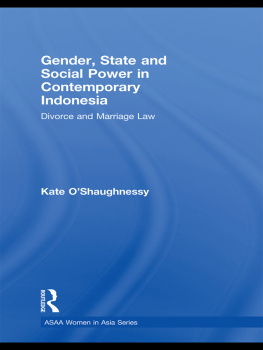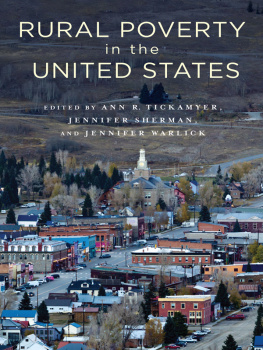
Power, Change, and Gender
Relations in Rural Java
This series of publications on Africa, Latin America, Southeast Asia, and Global and Comparative Studies is designed to present significant research, translation, and opinion to area specialists and to a wide community of persons interested in world affairs. The editor seeks manuscripts of quality on any subject and can usually make a decision regarding publication within three months of receipt of the original work. Production methods generally permit a work to appear within one year of acceptance. The editor works closely with authors to produce a high-quality book. The series appears in a paperback format and is distributed worldwide. For more information, contact the executive editor at Ohio University Press, 19 Circle Drive, The Ridges, Athens, Ohio 45701.
Executive editor: Gillian Berchowitz
AREA CONSULTANTS
Africa: Diane M. Ciekawy
Latin America: Brad Jokisch, Patrick Barr-Melej, and Rafael Obregon
Southeast Asia: William H. Frederick
The Ohio University Research in International Studies series is published for the Center for International Studies by Ohio University Press. The views expressed in individual volumes are those of the authors and should not be considered to represent the policies or beliefs of the Center for International Studies, Ohio University Press, or Ohio University.
Power, Change, and
Gender Relations in
Rural Java
A Tale of Two Villages
Ann R. Tickamyer
Pennsylvania State University
and
Siti Kusujiarti
Warren Wilson College
OHIO UNIVERSITY RESEARCH IN INTERNATIONAL STUDIES
SOUTHEAST ASIA SERIES NO. 125
OHIO UNIVERSITY PRESS
ATHENS
2012 by the
Center for International Studies
Ohio University
www.ohioswallow.com
To obtain permission to quote, reprint,
or otherwise reproduce or distribute
material from Ohio University Press publications,
please contact our rights
and permissions department at (740) 593-1154 or (740) 593-4536 (fax).
www.ohioswallow.com
Printed in the United States of America
All rights reserved
The books in the Ohio University Research
in International Studies Series
are printed on acid-free paper.

20 19 18 17 16 15 14 13 12 5 4 3 2 1
Library of Congress Cataloging-in-Publication Data
Tickamyer, Ann R.
Power, change, and gender relations in rural Java : a tale of two villages / Ann R. Tickamyer and Siti Kusujiarti.
p. cm. (Ohio University research in international studies, Southeast Asia series ; no. 125)
ISBN 978-0-89680-284-1 (pb : alk. paper) ISBN 978-0-89680-480-7 (electronic) 1. Women, JavaneseSocial conditionsCase studies. 2. Rural womenIndonesiaJavaSocial conditionsCase studies. 3. Sex roleIndonesiaJavaCase studies. I. Kusujiarti, Siti. II. Title.
HQ1754.J39T53 2011
305.4095982dc23 2011036225
Siti would like to dedicate this book to her late parents; Ann to her mother and late father.Contents
Illustrations
Maps
Tables
Photos
Following page 92
Acknowledgments
This book has been more than fifteen years in the making. When we began the research, we had no idea how long it would take, how many people it would involve, how much we would learn, or how dramatically our lives would change in the duration. The numbers of people involved in this project and who have assisted us literally span the globe and are so numerous that it would take a separate volume to list them all. As a start, we are grateful to our families, friends, colleagues, students, and many informants and contacts in the United States and in Indonesia. Numerous students and research assistants have contributed to this volume. Nona Norris at Ohio University helped with translation and transcription of interviews. Barby Badayos-Javer at Penn State provided important assistance in the final stages of manuscript preparation and index construction. The book has benefited from the close reading of formal and informal reviewers, especially Rachel Rinaldo and Carolyn Sachs, Elizabeth Collins, and anonymous readers. The advice and patience of senior editor Gillian Berchowitz of the Ohio University Press is much appreciated. The support of the National Science Foundation, the Toyota Foundation, and grants and fellowships from our respective universities made this research possible.
Ann is indebted to funding and support for this work from three universities: University of Kentucky, Ohio University, and in the last phase, Penn State University. At both UK and OU, she benefited from the help and advice of friends, colleagues, students, and the patient instruction of two Bahasa Indonesia teachers: Bu Popon at UK and Bu Harni at OU. The OU Center for International Studies, International Development Studies, Southeast Asian Studies, and the Department of Sociology and Anthropology faculty, staff, and students were invariably stimulating and motivating. Elizabeth Collins, Joani Kraynanski, and members of the gender and development learning community were key sources of input and moral support while working on this project. Ann Bennett was always a rock. Bambang Suwarno and the warmth and generosity of his delightful family must receive credit for stimulating the interests that led to this book. In both the U.S. and Indonesia, Sitis family has been especially helpful through their assistance, hospitality, friendship, and information. The welcome and assistance of Imam and Gita Prosodjo and family and the large numbers of OU mafia contributed generously to Anns education and travels in Indonesia. As always, Anns family has been a major source of support and welcome distraction.
Siti is grateful for the opportunities, funding, and support provided by the universities and college that she has been affiliated with or has connection to: University of Bengkulu, Gadjah Mada University, University of Kentucky, Ohio University, Western Carolina University, and Warren Wilson College. The Center for Womens Studies at Gadjah Mada University, through its two chairs, Prof. Dr. Mary Astuti and Prof. Dr. Nurhayati, enabled Siti to obtain research permits for the fieldwork; the Department of Sociology at the university, especially Prof. Dr. Sunyoto Usman, Prof. Dr. Nasikun, and Dr. Partini, facilitated finding research assistants and provided advice for the research. Siti also would like to thank her family, especially her husband, daughter, parents, brother and sister, sister-in-law, and brother-in-law, who have provided enormous support during the fieldwork and writing process.
We also want to express our gratitude to numerous people from Sleman and Bantul including the district heads, village heads, and especially those from the two villages: Bapak and Ibu Zaenal, Pak and Ibu Bagio, Pak and Ibu Seco, Pak and Ibu Rahmat Hartono, Ibu Raharjo, and Ibu Trahwati. They have shared their lives and perspectives, providing inspiration, and without them we would not have been able to write this book. Finally, the resilience, openness, and interest of the women and men in the two villages have supplied the material and motivation for this effort, and it is to them that the credit is due.





